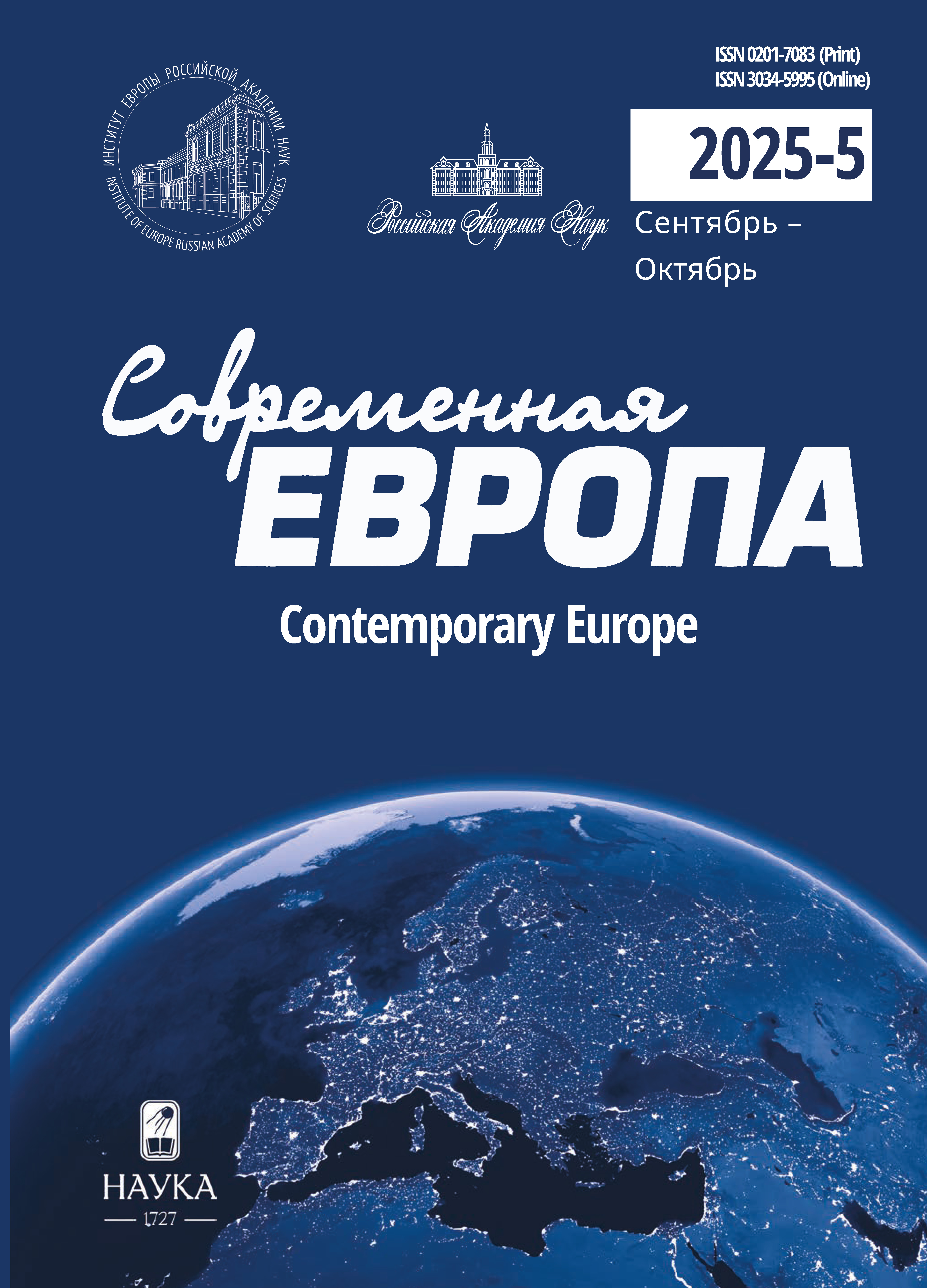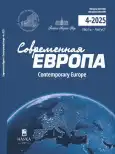НЕСОСТОЯВШАЯСЯ ДИВЕРГЕНЦИЯ: ПАРАДОКСЫ ПРАВОВОГО РАЗВИТИЯ БРИТАНИИ ПОСЛЕ ВЫХОДА ИЗ ЕС
- Авторы: Энтин М.Л1,2,3,4, Галушко Д.В5
-
Учреждения:
- МГИМО МИД России
- УрФУ
- БФУ им. И. Канта
- АЕВИС
- Финансовый университет при Правительстве Российской Федерации
- Выпуск: № 4 (132) (2025)
- Страницы: 64-76
- Раздел: ЕВРОПЕЙСКИЙ ПРОЦЕСС: СТРАНЫ И РЕГИОНЫ
- URL: https://rjsvd.com/0201-7083/article/view/691011
- DOI: https://doi.org/10.31857/S0201708325040060
- ID: 691011
Цитировать
Полный текст
Аннотация
Статья посвящена исследованию парадоксов правового развития Британии после выхода из ЕС (брекзита), который, вопреки ожиданиям полной правовой автономии, выявил устойчивость интеграционных связей и ограниченность реальной дивергенции. Авторы рассматривают противоречие между декларируемым восстановлением суверенитета и фактическим сохранением значительного влияния права ЕС на британскую правовую систему. Особое внимание уделено механизмам инкорпорации «сохранённого» и «ассимилированного» права ЕС в национальное законодательство, а также роли Соглашения о торговле и сотрудничестве (СТС) в поддержании нормативной конвергенции. На основе эмпирических данных продемонстрировано, что несмотря на политическую риторику о дивергенции, большая часть acquis communautaire остаётся неизменной, а в ряде областей британское право продолжает следовать европейским стандартам. Рассмотрены институциональные и экономические факторы, ограничивающие радикальное правовое размежевание, включая давление бизнес-сообщества и необходимость сохранения совместимости с Единым рынком ЕС. Сделан вывод, что брекзит не привёл к полному разрыву правовых связей, а скорее трансформировал их в новую форма взаимодействия, где автономия сочетается с вынужденной адаптацией к регуляторным реалиям ЕС. Статья вносит вклад в изучение дезинтеграционных процессов в праве, подчёркивая устойчивость интеграционного наследия и методологическую значимость британского опыта для других региональных объединений, включая Евразийский экономический союз.
Ключевые слова
Об авторах
М. Л Энтин
МГИМО МИД России; УрФУ; БФУ им. И. Канта; АЕВИС
Email: entinmark@gmail.com
Доктор юридических наук, профессор, заведующий кафедрой интеграционного права и прав человека МГИМО МИД России, профессор МГИМО, УрФУ, БФУ им. И. Канта, председатель Правления АЕВИС Москва, Россия; Москва, Россия; Москва, Россия; Москва, Россия
Д. В Галушко
Финансовый университет при Правительстве Российской Федерации
Email: galushkodv@gmail.com
Доктор юридических наук, доцент, профессор Кафедры правового регулирования экономической деятельности Москва, Россия
Список литературы
- Ананьева Е.В. (2019) Брекзит как процесс. Научно-аналитический вестник Института Европы РАН. № 2(8). С. 26–33. doi: 10.15211/vestnikieran220192632.
- Бабынина Л.О. (2021) Брекзит завершен, но сага будет продолжаться. Европейский союз: факты и комментарии. № 103. С. 23–30. doi: 10.15211/eufacts120212330.
- Бажан А.И. и др. (2017) Экономические аспекты брекзита. Ин-т Европы РАН. Доклады Института Европы, ФГБ Н Ин-т Европы Российской акад. наук; № 345, Москва.
- Богдановская И.Ю. (2021) Конституционно-правовые последствия брекзита: суверенитет парламента или народа? Право. Журнал Высшей школы экономики. № 3. С. 231–253. doi: 10.17323/2072-8166.2021.3.231.253.
- Британия после брекзита: Монография [отв. ред. К.А. Годованюк] (2021). Федеральное государственное бюджетное учреждение науки Институт Европы Российской академии наук, Москва. doi: 10.15211/reports82021_386. EDN ZNCCCD.
- Галушко Д.В. (2023) Теория и практика правового регулирования интеграционных процессов в свете вызовов брекзита: диссертация на соискание ученой степени доктора юридических наук. МГИМО, Москва. EDN UOHISB.
- Громыко А.А. (2016) ЕС и брекзит: «Цель и само существование нашего союза под вопросом». Год планеты: Экономика, политика, безопасность. Ежегодник. Том Выпуск 2016 года. Идея-Пресс, Москва. С. 168–177.
- Коданева С.И. (2022) Правовые последствия брекзита для регионов Британии и теоретические основы правовых механизмов предотвращения сецессии. Актуальные проблемы государства и права. Т. 6. № 2(22). С. 140–150. doi: 10.20310/2587-9340-2022-6-2-140-150.
- Коданева, С.И. (2023) Последствия брекзита для конституционной системы Британии. Государство и право. № 1. С. 114–122. doi: 10.31857/S102694520024108-9.
- Коданева, С.И. (2023) Брекзит: причины, предпосылки и правовые последствия. Институт научной информации по общественным наукам РАН, Москва. doi: 10.31249/brexit/2023.00.00.
- Лобов М.Б. (2024) Правовые аспекты дезинтеграции: уроки выхода государств из европейских региональных организаций. Московский журнал международного права. № 4. С. 15–34. doi: 10.24833/0869-0049-2024-4-15-34.
- Фадеева И.А. (2025) Последствия брекзита на формирование интеграционных процессов ЕС. Экономика и предпринимательство. № 1(174). С. 545–549. doi: 10.34925/EIP.2024.174.1.097.
- Энтин М.Л., Галушко Д.В. (2021) О правовых последствиях брекзита (на примере защиты персональных данных). Современная Европа. № 5(105). С. 45–55. doi: 10.15211/soveurope520214555.
- Baldini G., Bressanelli E., Gianfreda S. (2020). Taking back control? Brexit, sovereignism and populism in Westminster (2015–17). European politics and society. No. 21(2). P. 219–234. doi: 10.1080/23745118.2019.1632584.
- Bradford A. (2020). The BUNKsels Effect: How the European Union Rules the World. Oxford University Press, Oxford. DOI: https://doi.org/10.1093/oso/9780190088583.001.0001
- Brownlow G. (2023). Northern Ireland and the Economic Consequences of Brexit: taking back control or perpetuating underperformance? Contemporary Social Science. No. 18(2). P. 168–184. DOI: https://doi.org/10.1080/21582041.2023.2190157
- Bulmer S., Quaglia L. (Eds.) (2019). The Politics and Economics of Brexit. Routledge, London. DOI: https://doi.org/10.4324/978042423659
- Craig P. (2020). Brexit, A Drama: The Endgame – Part I. European Law Review. No. 2. P. 163–182.
- Dhingra S., Ottaviano G., Sampson T., Van Reenen J. (2016) The consequences of Brexit for UK trade and living standards. URL: https://cep.lse.ac.uk/pubs/download/brexit02.pdf (дата обращения: 10.03.2025).
- Dhingra S., Sampson T. (2022) Expecting Brexit. Annual Review of Economics. Vol. 14(1). P. 495–519. doi: 10.1146/annurev-economics-051420-104231
- Du J., Shepotylo O., Yuan, X. (2025) How did the Brexit uncertainty impact services exports of UK firms? Journal of International Business Policy. No. 8. P. 80–104. DOI: https://doi.org/10.1057/s42214-024-00202-6
- Eeckhout P. (2021) Brexit after the negotiation of the trade and cooperation agreement: who takes back control of what? Revista de Derecho Comunitario Europeo. No. 68. P. 11–22. DOI: https://doi.org/10.18042/cepc/rdce.68.01
- Fabbrini F. (ed.) (2024) The Law & Politics of Brexit: Volume V: The Trade and Cooperation Agreement. Oxford University Press, Oxford. DOI: https://doi.org/10.1093/oso/9780198908289.001.0001
- Gamble A. (2018) Taking back control: the political implications of Brexit. Journal of European Public Policy. No. 25 (8). P. 1215–1232.
- Gibson L. (2024) The end of REUL? Progress in reforming retained EU law: Research briefing. House of Commons, London.
- Menon A., Wager A. (2020). Taking back control: sovereignty as strategy in Brexit politics. Territory, Politics, Governance. No. 8(2). P. 279–284. DOI: https://doi.org/10.1080/21622671.2019.1702895
- Peers S. The End – or a New Beginning? The EU/UK Withdrawal Agreement. Yearbook of European Law, Vol. 39. P. 122–198. DOI: https://doi.org/10.1093/yel/yea010
- Thompson H. (2021) The European Geopolitical Space and the Long Path to Brexit (The Government and Opposition/Lennard Schapiro Lecture 2020). Government and Opposition. No. 56(3). P. 385–404. doi: 10.1017/gov.2021.1
Дополнительные файлы











